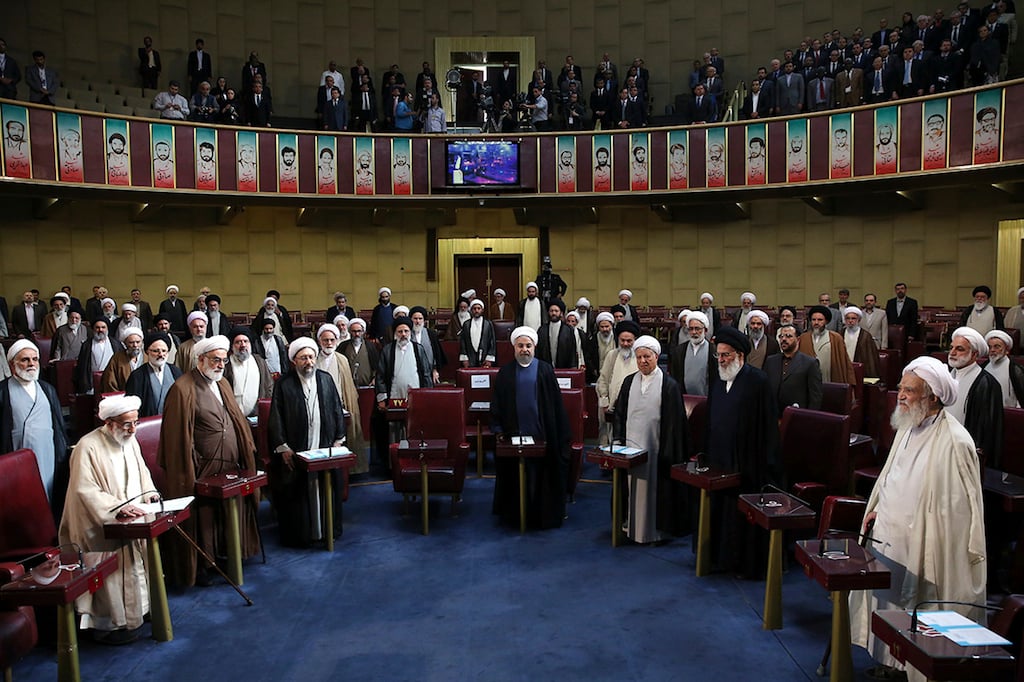
On 26 February 2016, two elections were held in Iran simultaneously: elections for the tenth parliament and the fifth Assembly of Experts. The second round of parliamentary elections was held two months later. Although the majority of the 12,000 candidates registered for 290 parliamentary seats and 801 for 88 Assembly of Experts seats did not make it through the Council of Guardians’ vetting process, many because of perceived reformist and moderate leanings, the turnout proved to be less affected by that process. Around 34 million Iranians, 62% of eligible voters, cast their votes. The percentage differed from one province to the other – turnout in the capital Tehran was around 50% – but the general turnout was quite satisfactory for the political system; a fact that was obvious in Supreme Leader Ayatollah Ali Khamenei and President Hassan Rouhani’s speeches after the elections.
Given Khamenei’s age (77), the elections for the Assembly of Experts, the clerical body tasked with electing, mandating and dismissing the Supreme Leader, attracted much attention. Yet the vetting process, which reduced the number of assembly hopefuls from 801 to 161, left little sense of competition; in some districts there was only one candidate. The attention stemmed from the fact that the new assembly is expected to play a significant role choosing Khamenei’s successor since its members are only elected every eight years. As predicted, the body’s composition did not change drastically. Nevertheless, with former president and current head of the Expediency Council Hashemi Rafsanjani and President Rouhani getting the most votes, the moderates were delivered a moral victory.
The parliamentary elections proved to be much more competitive despite the vetting process. An average of more than 21 nominees competed for every seat. It is no secret that the previous parliament’s conservative majority had put the Rouhani administration under considerable pressure after he took office in 2013. As a result, the government was eager to see a change in the parliament and actively supported pro-government candidates, many of whom were brought under the banner of the List of Hope, a coalition headed by Mohammad Reza Aref. The List of Hope, which was backed by popular figures such as Rouhani, former president Mohammad Khatami, Rafsanjani and Hassan Khomeini, a grandson of Ayatollah Khomeini, who led the revolution that saw the creation of the Islamic Republic in 1979, won 122 out of 290 seats including all 30 seats in Tehran. The total number of seats won by reformists and moderates within and outside the List of Hope was 137.
With 80 seats, the hardline Grand Coalition of Principlists came second. Headed by Gholam Ali Haddad-Adel, the coalition was unable to win a single seat in Tehran, leaving Haddad-Adel himself out of parliament. The coalition, which won an absolute majority of 184 seats in the previous parliamentary elections, appeared to be the biggest loser in these elections compared to its rival, the List of Hope, which increased its number of seats from 20 in the previous parliament to 122. In general, the election results and the changes within the two bodies, demonstrate some political realities. Here are five main points:
– Acting within the political system: It became very apparent that Iranians are seeking change within the system, not without it. There are two main reasons for this: first, unlike other Middle Eastern nations, Iran has already experienced a revolution and its unexpected and sometimes unintended outcomes; and second, in the past five years Iranians have seen what acting outside the system has meant for most of their neighbours, and there is a widespread feeling that any dramatic change could threaten Iran’s stability and security. This sentiment was also obvious during the 2013 presidential elections.
– Lack of popular figures: Despite the fact that the List of Hope’s reformists and moderates did well against an organized rival that had held the absolute majority for the previous four years, they were clearly in need of popular figures to succeed. This was obvious during the election of the parliamentary speaker. Despite Aref’s position as the head of the List of Hope, Ali Larijani, who ran independently, was able to secure the majority needed to be reelected as the speaker.
– Lack of popularity: Principlists have proved once again their lack of popularity. Although they gained enough votes in Tehran to remain an effective party in the parliament, their results show that in competitive elections, they cannot secure a majority. They only did well once their rivals boycotted the elections or were forced out by the vetting process.
– Vetting by vote: A new mechanism was introduced during the elections. Those who suffered the most from the Guardian Council’s vetting process could inflict the same damage on their rivals at the ballot box. Reformists and moderates compiled two lists of their rivals only to force their main rivals out through the election process. This was obvious in the list of Hashemi Rafsanjani, whose main aim was to force out hardliner Ayatollahs Yazdi, Mesbah-Yazdi and Jannati at the ballot box. Even so, Jannati survived, and was even elected chairman of the Assembly of Experts.
– More friendly to the administration: Rouhani’s administration seems to be the overall winner of the process. First, it got rid of the overtly conservative majority in parliament. Second, it secured a good number of parliamentary seats to back its policies. And third, a more balanced parliament seems ideal for a president in that it literally stands between the two main rival factions. In general, the elections are not expected to drastically change the balance of power between the main factions. As such, the new parliament is expected to be more cooperative or at least less hostile towards government policies.


